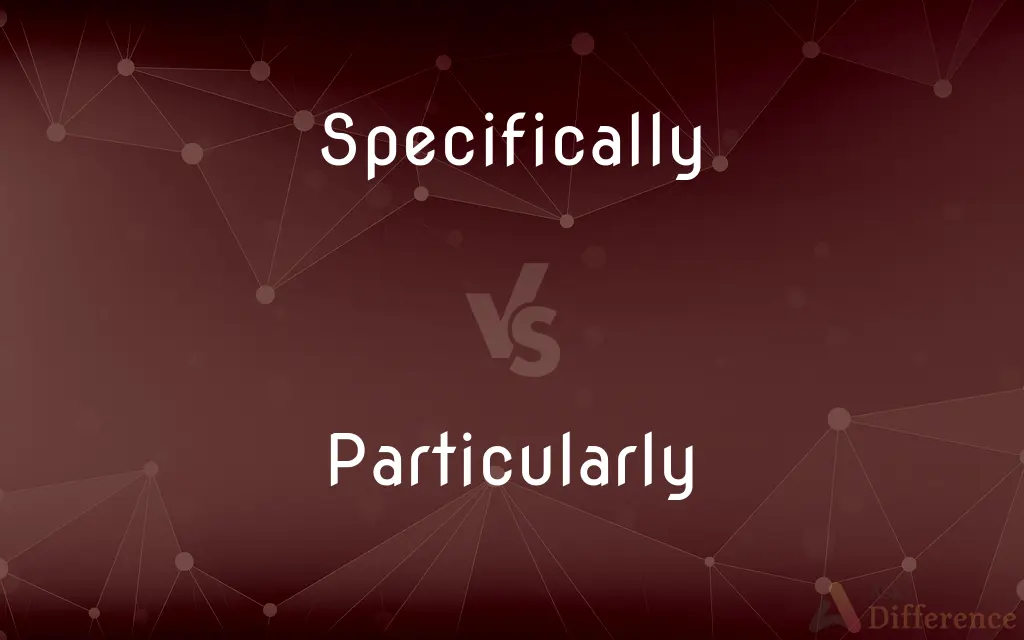Specifically vs. Particularly — What's the Difference?
Edited by Tayyaba Rehman — By Fiza Rafique — Updated on April 8, 2024
Specifically refers to something with a distinct or precise nature, focusing on particular details. Particularly emphasizes something of special importance or significance among others.

Difference Between Specifically and Particularly
Table of Contents
ADVERTISEMENT
Key Differences
Specifically is used when pointing out a distinct element or detail within a broader category, indicating a clear and precise identification. For example, when saying "The instructions were specifically designed for beginners," it implies these instructions are tailored with exact details for beginners. Whereas, particularly is used to highlight a level of importance or significance, often implying that something stands out among others. Saying "The instructions are particularly useful for beginners" suggests that among many qualities, their usefulness for beginners stands out.
When employing "specifically," the speaker often aims to narrow down a topic or focus to a singular point, ensuring clarity and reducing ambiguity. This term helps in providing exact information or specific instances. On the other hand, using "particularly" might not narrow down the subject to one specific point but rather indicate a high degree of relevance or emphasis on one aspect over others, without excluding the possibility of other relevant aspects.
In communication, "specifically" can serve as a critical tool for clarity, making sure the audience understands the exact point or detail being discussed. It's especially useful in instructions, technical descriptions, or when pinpointing corrections. Whereas, "particularly" can be more reflective of the speaker's perspective or evaluation, emphasizing what they find notably important or significant, which can be subjective.
The use of "specifically" is crucial in contexts where precision is key, such as legal documents, scientific research, and technical manuals, where every detail must be clearly defined and understood. Meanwhile, "particularly" finds its strength in persuasive writing, critiques, and personal opinions, where the emphasis on certain aspects can guide the reader’s perception or understanding towards the speaker's viewpoint.
"Specifically" and "particularly" both play vital roles in effective communication but serve different purposes. The former focuses on precision and specificity, eliminating any room for ambiguity, while the latter emphasizes importance or significance within a broader context, adding a layer of subjective evaluation or emphasis.
ADVERTISEMENT
Comparison Chart
Primary Use
To indicate precision and specificity
To emphasize importance or significance
Context
Technical, instructional, specific clarification
Persuasive, critical, subjective emphasis
Focus
Narrowing down to exact details
Highlighting importance among other aspects
Implication
Exclusion of other elements outside the specific
Inclusion of other elements but with less emphasis
Example Use Case
"Specifically designed for X purpose"
"Particularly useful for X situation"
Compare with Definitions
Specifically
In a precise or exact manner.
The guidebook was specifically written for novice hikers.
Particularly
To a higher degree than usual or average.
This winter was particularly cold.
Specifically
Explicitly stated or indicated.
The contract specifically mentions the due dates for each payment.
Particularly
In regard to something mentioned.
The desserts, particularly the chocolate cake, were delicious.
Specifically
In a way that is clear and unambiguous.
He specifically stated that he would not attend the meeting.
Particularly
Used to single out one or more elements among a group.
She has done well in all her subjects, particularly in science.
Specifically
For a particular reason, purpose, or instance.
She asked specifically for red roses for her birthday.
Particularly
Signifying something of notable interest or importance.
The study highlights areas that are particularly vulnerable to climate change.
Specifically
With distinct identity or characteristic in mind.
The laws were specifically designed to protect endangered species.
Particularly
Especially, or more than usual.
The speech was particularly inspiring.
Specifically
Explicitly set forth; definite
Wrote specific instructions.
Particularly
To a great degree; especially
I particularly like the brown shoes.
Specifically
Clear or detailed in communicating
Be specific when telling us what you need.
Particularly
With particular reference or emphasis; individually or specifically
"Everyone has a moment in history which belongs particularly to him" (John Knowles).
Specifically
Limited, distinctive, or unique
Problems specific to small colleges.
Particularly
With regard to particulars; in detail.
Specifically
Intended for, applying to, or acting on a particular thing
A specific remedy for warts.
Particularly
(focus) Especially, extremely.
The apéritifs were particularly stimulating.
Specifically
Concerned particularly with the subject specified. Often used in combination
"age-specific voting patterns" (A. Dianne Schmidley).
Particularly
(degree) To a great extent.
Specifically
Relating to, characterizing, or distinguishing a species
A specific name.
Particularly
Specifically, uniquely or individually.
Specifically
Designating a disease produced by a particular microorganism or condition.
Particularly
In detail; with regard to particulars.
Specifically
Having a remedial influence or effect on a particular disease.
Particularly
(dated) In a particular manner; fussily.
Specifically
(Immunology) Having an affinity limited to a particular antibody or antigen.
Particularly
In a particular manner; expressly; with a specific reference or interest; in particular; distinctly.
Specifically
Designating a customs charge levied on merchandise by unit or weight rather than according to value.
Particularly
In an especial manner; especially; in a high degree; as, a particularly fortunate man; a particularly bad failure.
The exact propriety of Virgil I particularly regarded as a great part of his character.
Specifically
Designating a commodity rate applicable to the transportation of a single commodity between named points.
Particularly
To a distinctly greater extent or degree than is common;
He was particularly fussy about spelling
A particularly gruesome attack
Under peculiarly tragic circumstances
An especially (or specially) cautious approach to the danger
Specifically
Something particularly fitted to a use or purpose.
Particularly
Specifically or especially distinguished from others;
Loves Bach, particularly his partitas
Recommended one book in particular
Trace major population movements for the Pueblo groups in particular
Specifically
A remedy intended for a particular ailment or disorder.
Particularly
Uniquely or characteristically;
These peculiarly cinematic elements
A peculiarly French phenomenon
Everyone has a moment in history which belongs particularly to him
Specifically
A distinguishing quality or attribute.
Specifically
Specifics Distinct items or details; particulars.
Specifically
In a specific manner, applying to or naming a particular thing or things, expressly, explicitly.
Specifically
For a specific purpose or reason.
Specifically
In a specific manner.
Specifically
In distinction from others;
A program specifically for teenagers
He is interested specifically in poisonous snakes
Common Curiosities
How is particularly used in a sentence?
Particularly is used to emphasize something's importance or significance, often highlighting it among others.
Can specifically and particularly be used interchangeably?
While they can sometimes be used in similar contexts, they usually serve different purposes; specifically for precision, and particularly for emphasis.
How does particularly enhance a statement?
By signaling that something is of special importance or significance, making it stand out among other details.
Why is it important to use specifically in instructions?
Using specifically ensures that instructions are clear, precise, and understood exactly as intended, leaving no room for ambiguity.
Can particularly imply bias?
Yes, since it often reflects the speaker's viewpoint or evaluation, particularly can imply a certain level of subjectivity or bias.
What does specifically mean?
Specifically refers to something precise or particular, with clear definition or detail.
Is specifically only used in technical contexts?
Though often used in technical contexts for its precision, specifically can be employed whenever exactness is required.
Can I use specifically to make my writing more concise?
Yes, by focusing on precise details, specifically can help make writing clearer and more concise.
Can the use of specifically be seen as limiting?
Yes, because it narrows down focus to specific details, it can sometimes exclude broader considerations.
Does using particularly make a statement subjective?
It can, as particularly often introduces a degree of personal emphasis or perspective on what is important.
Why might someone choose particularly over specifically?
To emphasize the significance of certain aspects without limiting the discussion to those points alone.
How does specifically affect the clarity of communication?
It enhances clarity by narrowing down information to exact and precise details, eliminating misunderstandings.
Is particularly useful in academic writing?
Yes, particularly can be useful in academic writing to highlight significant findings or arguments.
How do specifically and particularly differ in legal documents?
Specifically is used to detail precise obligations or conditions, while particularly might highlight significant clauses or considerations.
How do these words help in setting the tone of a document?
Specifically can make a document appear more formal and precise, whereas particularly might make it seem more evaluative or persuasive.
Share Your Discovery

Previous Comparison
Screen vs. Monitor
Next Comparison
Student vs. TraineeAuthor Spotlight
Written by
Fiza RafiqueFiza Rafique is a skilled content writer at AskDifference.com, where she meticulously refines and enhances written pieces. Drawing from her vast editorial expertise, Fiza ensures clarity, accuracy, and precision in every article. Passionate about language, she continually seeks to elevate the quality of content for readers worldwide.
Edited by
Tayyaba RehmanTayyaba Rehman is a distinguished writer, currently serving as a primary contributor to askdifference.com. As a researcher in semantics and etymology, Tayyaba's passion for the complexity of languages and their distinctions has found a perfect home on the platform. Tayyaba delves into the intricacies of language, distinguishing between commonly confused words and phrases, thereby providing clarity for readers worldwide.
















































